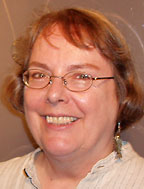Workshop Report, Part Two
In Part One I talked about the workshop. Here I'll talk about some of the books the students made.
We used copper clad plastic for the pages and the covers of the books. This is a material used to make pc boards. It is a thin sheet of plastic on the inside, covered on both the front and back with a thin layer of copper. It takes a patina like regular copper. It is also much easier to cut with a jeweler's saw than copper, which starts people out with an advantage. Before the workshop I cut out the covers and three pages for each book. Each book is 2 inches high. I also drilled holes in the books so they could be bound with two jump rings. I wanted to save them some time so they could get right to the fun part. Six hours isn't long enough to really get involved with a project.
The finished books were all very different. They were all the same size, the same material, and started with the same number of pages. But everyone had different ideas about how to embellish the books.
For some reason Blogger won't let me post photos right now. I have no idea what's going on. There are links to each image that I talk about. There are also more photos of student's books on my web site in the Student Gallery.
Viviane cut a page with a shape that came up out of her book to echo a cherub. She also added paper pages between the copper ones.
Patty used the jeweler's saw to cut out a wave shape and a fish for her cover. She also used bead chain instead of jump rings to bind her book.
Rosine took it to heart when I said books don't have to close and added metal screening pages with things wired on.
Some people are good at coming into a workshop and making a finished product that they are happy with. Others spend their time learning the techniques, but don't have a finished thing to take home. I think either way works fine. I am the second type of person. It takes me a long time to take in the ideas in a way that I can relate to in my work. So when I'm teaching, I try to make sure people get the techniques, and don't worry about the finished products too much. This is one area where on-going classes are better than workshops. There is more time to develop ideas.
Next: I need to clean up the huge mess on my worktable and start taking photos of 7 Extinction Events. (I said that last week, too, didn't I?)
We used copper clad plastic for the pages and the covers of the books. This is a material used to make pc boards. It is a thin sheet of plastic on the inside, covered on both the front and back with a thin layer of copper. It takes a patina like regular copper. It is also much easier to cut with a jeweler's saw than copper, which starts people out with an advantage. Before the workshop I cut out the covers and three pages for each book. Each book is 2 inches high. I also drilled holes in the books so they could be bound with two jump rings. I wanted to save them some time so they could get right to the fun part. Six hours isn't long enough to really get involved with a project.
The finished books were all very different. They were all the same size, the same material, and started with the same number of pages. But everyone had different ideas about how to embellish the books.
For some reason Blogger won't let me post photos right now. I have no idea what's going on. There are links to each image that I talk about. There are also more photos of student's books on my web site in the Student Gallery.
Viviane cut a page with a shape that came up out of her book to echo a cherub. She also added paper pages between the copper ones.
Patty used the jeweler's saw to cut out a wave shape and a fish for her cover. She also used bead chain instead of jump rings to bind her book.
Rosine took it to heart when I said books don't have to close and added metal screening pages with things wired on.
Some people are good at coming into a workshop and making a finished product that they are happy with. Others spend their time learning the techniques, but don't have a finished thing to take home. I think either way works fine. I am the second type of person. It takes me a long time to take in the ideas in a way that I can relate to in my work. So when I'm teaching, I try to make sure people get the techniques, and don't worry about the finished products too much. This is one area where on-going classes are better than workshops. There is more time to develop ideas.
Next: I need to clean up the huge mess on my worktable and start taking photos of 7 Extinction Events. (I said that last week, too, didn't I?)
Labels: Classes and Demos

0 Comments:
Post a Comment
Links to this post:
Create a Link
<< Home